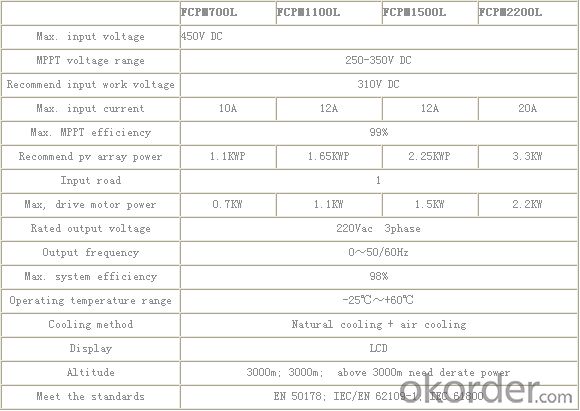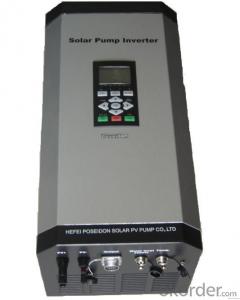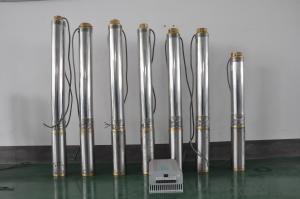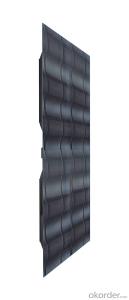Solar pump inverter FCPM2200L
- Loading Port:
- China Main Port
- Payment Terms:
- TT OR LC
- Min Order Qty:
- -
- Supply Capability:
- -
OKorder Service Pledge
Quality Product, Order Online Tracking, Timely Delivery
OKorder Financial Service
Credit Rating, Credit Services, Credit Purchasing
You Might Also Like
Solar pump inverter FCPM2200L Product Description:
Solar water pumping system is constructed with solar panel array,solar pump inverter and AC water pump, DC current produced from solar panel will be delivered to solar pump inverter,and it will convert it into AC current to drive water pump,and will automatically regulate output frequency according to sun radiance intensity,maximally realize MPPT tracking function.
Features
Adopting the proposed dynamic VI maximum power point tracking (MPPT) control method, with fast response, and reliable operation, achieves efficiency of 99%.
Designed with variable frequency driver, greatly improves efficiency
Extremely high efficiency
Digital mode control, with automatic operation and manual operation mode options
Complete protection functions
Adopts intelligent IPM module, with high reliability
LCD display and operation panel, in real time presents operating data
Optional for water level measurement and control circuit
Applicable for general ACC pumps, like centrifugal pump, piston pump etc.
Independent intellectual property; Highly effective, the redundant reliability, exempts the maintenance and the long life.
The pumps are soft started, fully protected.
No batteries are used. So better Sunlight, more water.
Datasheet.

- Q:How does the performance of a solar pump vary with different solar panel technologies?
- The performance of a solar pump can vary significantly depending on the type of solar panel technology used. Different solar panel technologies have different efficiencies, which directly impact the amount of energy they can convert from sunlight. Firstly, traditional crystalline silicon solar panels, both monocrystalline and polycrystalline, have been widely used in solar pump systems. These panels have a relatively high efficiency, typically ranging from 15% to 20%. This means that they can convert a higher percentage of sunlight into electricity, resulting in improved performance for solar pumps. These panels are known for their durability and long lifespan, making them a reliable choice for solar pump applications. Secondly, thin-film solar panels, such as amorphous silicon, cadmium telluride, and copper indium gallium selenide (CIGS), offer different performance characteristics. Thin-film panels have lower efficiencies compared to crystalline silicon panels, typically ranging from 10% to 12%. While their efficiency may be lower, thin-film panels have the advantage of being lightweight, flexible, and easy to install. Therefore, if the available space for solar panels is limited or if flexible panels are required, thin-film technology can be a suitable choice for solar pump systems. Lastly, emerging solar panel technologies like perovskite and multi-junction solar cells are being researched and developed. These technologies have the potential to achieve higher efficiencies compared to traditional silicon panels. Although they are not yet widely available or economically viable for large-scale applications, they hold promise for future advancements in solar pump performance. In summary, the performance of a solar pump is directly influenced by the solar panel technology used. Higher efficiency panels, such as crystalline silicon, can generate more electricity from sunlight, resulting in improved pump performance. However, factors such as cost, available space, and specific application requirements should also be considered when selecting the most appropriate solar panel technology for a solar pump system.
- Q:What is the expected lifespan of the motor used in a solar pump system?
- The expected lifespan of the motor used in a solar pump system can vary depending on various factors. Generally, a well-maintained and high-quality motor can last anywhere between 10 to 20 years. However, it is important to note that the lifespan can be influenced by factors such as the quality of the motor, the frequency of use, the operating conditions, and the maintenance practices. A high-quality motor with proper maintenance and regular servicing can significantly extend its lifespan. It is crucial to follow the manufacturer's guidelines for maintenance, which may include regular lubrication, cleaning, and inspection of the motor components. Additionally, protecting the motor from extreme weather conditions, such as excessive heat or moisture, can also help prolong its lifespan. Regular monitoring of the motor's performance and addressing any issues promptly can prevent further damage and increase its longevity. If any signs of malfunction or decreased performance are noticed, it is advisable to consult a professional technician for repairs or replacements. Ultimately, the expected lifespan of a motor used in a solar pump system can be influenced by various factors, but proper maintenance and care can ensure its optimal performance and longevity.
- Q:Are solar pumps more cost-effective than traditional pumps?
- Yes, solar pumps are more cost-effective than traditional pumps. While the initial investment for solar pumps may be higher, they have significantly lower operating costs over their lifetime. Solar pumps rely on renewable energy from the sun, eliminating the need for electricity or fuel, which can be expensive and subject to price fluctuations. Additionally, solar pumps require minimal maintenance and have a longer lifespan compared to traditional pumps, reducing replacement and repair costs. Furthermore, solar pumps often qualify for government incentives and subsidies, further reducing the overall cost. The cost-effectiveness of solar pumps is particularly evident in areas with abundant sunlight, as they can provide a reliable and cost-efficient water pumping solution, especially in remote or off-grid locations.
- Q:Solar water heater automatic pressurized water pump does not turn how maintenance
- If you do not turn the pressure pump is the problem. If the pump itself is the problem, then you can only go to a professional place to repair, if the coil is broken, throw directly to buy a new bar Repair is more expensive and can not guarantee quality
- Q:How efficient are solar pumps compared to traditional pumps?
- Solar pumps are generally more efficient compared to traditional pumps. This is because solar pumps use renewable energy from the sun, eliminating the need for fossil fuels or electricity. They also have fewer moving parts, making them more reliable and requiring less maintenance. Additionally, solar pumps can be designed to match the specific needs of the application, further enhancing their efficiency.
- Q:Can solar pumps be integrated with existing generator or battery backup systems?
- Yes, solar pumps can be integrated with existing generator or battery backup systems. By combining solar power with existing backup systems, it ensures a reliable and continuous water supply even during periods of low sunlight or power outage. This integrated approach provides a sustainable solution that maximizes the efficiency and reliability of water pumping systems.
- Q:How does a solar pump handle water with high levels of salt?
- A solar pump can handle water with high levels of salt by utilizing a reverse osmosis (RO) system. Through this process, the pump pushes the saltwater through a membrane that filters out the salt particles, allowing clean water to pass through. This ensures that the pump is able to effectively handle water with high levels of salt and provide usable, fresh water for various applications.
- Q:How does a solar pump help in reducing electricity bills?
- A solar pump helps in reducing electricity bills by utilizing solar energy to power the pump instead of relying on electricity from the grid. This eliminates the need for consuming conventional electricity, which in turn reduces the amount of electricity consumed and ultimately leads to lower electricity bills.
- Q:Can solar pumps be used for water supply in dairy farms or livestock facilities?
- Yes, solar pumps can be used for water supply in dairy farms or livestock facilities. Solar pumps are a sustainable and cost-effective solution that can provide a reliable water source for animals. They can help reduce dependency on grid electricity and diesel generators, making them an environmentally friendly choice for water supply in agricultural settings.
- Q:Can solar pumps be used for water supply in community centers or social projects?
- Yes, solar pumps can definitely be used for water supply in community centers or social projects. Solar pumps are a sustainable and cost-effective solution that can provide reliable water supply without relying on electricity grids or fuel. They can be easily installed in remote areas and can efficiently cater to the water needs of the community center or social project. Additionally, solar pumps are environmentally friendly as they utilize clean energy from the sun, reducing carbon emissions and promoting sustainability.
1. Manufacturer Overview |
|
|---|---|
| Location | |
| Year Established | |
| Annual Output Value | |
| Main Markets | |
| Company Certifications | |
2. Manufacturer Certificates |
|
|---|---|
| a) Certification Name | |
| Range | |
| Reference | |
| Validity Period | |
3. Manufacturer Capability |
|
|---|---|
| a)Trade Capacity | |
| Nearest Port | |
| Export Percentage | |
| No.of Employees in Trade Department | |
| Language Spoken: | |
| b)Factory Information | |
| Factory Size: | |
| No. of Production Lines | |
| Contract Manufacturing | |
| Product Price Range | |
Send your message to us
Solar pump inverter FCPM2200L
- Loading Port:
- China Main Port
- Payment Terms:
- TT OR LC
- Min Order Qty:
- -
- Supply Capability:
- -
OKorder Service Pledge
Quality Product, Order Online Tracking, Timely Delivery
OKorder Financial Service
Credit Rating, Credit Services, Credit Purchasing
Similar products
New products
Hot products
Hot Searches
Related keywords



























